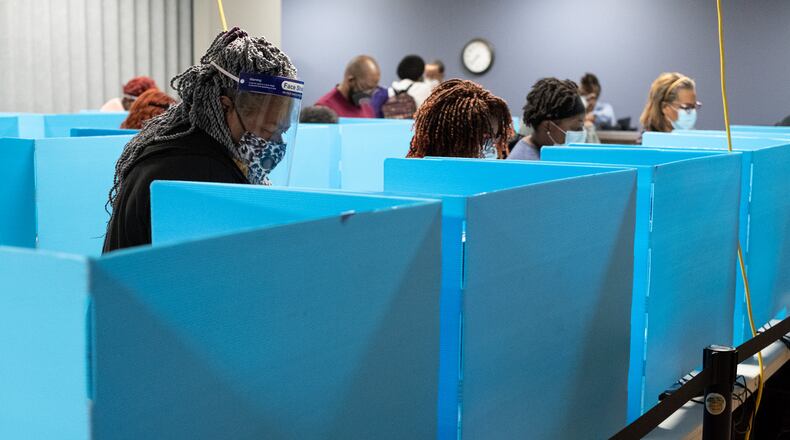DeKalb elections officials say they’ll use early voter turnout data to decide how to distribute a new batch of check-in devices at Election Day precincts.
Leaders hope the strategy will help limit long lines on Nov. 3 — and avoid the optics associated with widely varying wait times in different parts of the county.
“While there’s no one on this board or in the department who would intentionally disenfranchise any voter in this county, it can happen unintentionally by not responding to the data and the information that we have,” elections board member Dele Lowman Smith said during a Wednesday morning meeting.
Across Georgia, tablets known as poll pads are used to check in voters at their precincts. During other recent elections, technical issues with the devices and the time involved with the check-in process have often helped fuel long lines.
DeKalb recently purchased 125 new poll pads to go with 500 devices allotted by the state for next week’s election.
Each of DeKalb’s 176 Election Day precincts will have at least two poll pads, elections director Erica Hamilton said Tuesday, and no precinct will have fewer devices than normal. But Hamilton said having more tablets available means the department can be more flexible.
Additional poll pads will be sent to locations where fewer people have already voted early, either in-person or by mail. Elections officials think those precincts will have higher demand on Election Day, and that more poll pads can help move things along.
“Now that we have enough, we can do what we need to do to make sure it flows smoothly on Election Day,” Hamilton said.
The issue is of long voting lines is particularly sensitive in DeKalb.
Lengthy waits at the start of the early voting period led DeKalb Democrats chairman John Jackson to call for Hamilton and elections board chairman Sam Tillman to resign. Three county commissioners later raised questions about what they called “alarming disparities” between wait times in predominantly Black areas of southern DeKalb versus the predominantly white areas to the north.
Decisions about where to send additional pads are expected to be made on Friday, when officials have a more complete picture of early voting turnout.
Through Tuesday, more than 162,000 DeKalb voters had cast advance in-person ballots. Add in the roughly 106,000 absentee ballots that had been returned and, a week before the election, about 47% of registered DeKalb voters had already cast their votes.
Friday is the last day for advance in-person voting. And while the inclement weather that’s expected could put a bit of a damper on things, the final days of the early voting period typically bring a surge in turnout.
Lowman Smith said initial analysis suggests that north DeKalb voters have taken more advantage of early and absentee voting. The distribution of extra poll pads, then, is likely to be focused in other parts of the county.
“We as a board and a department are 100% committed to ensuring equity,” Lowman Smith said.
About the Author
The Latest
Featured



